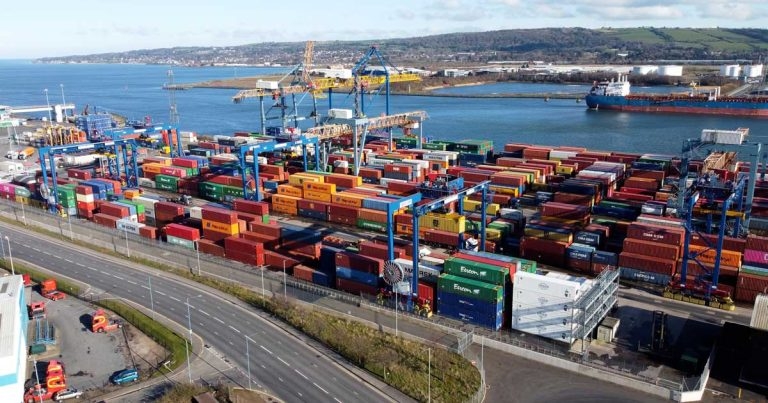26 Sept 2023
Measures contained within the Government’s Border Target Operating Model proposals are set to be introduced next year, amid concerns from MPs about lengthy delays to this point.

Belfast's harbour and docks. Image: © peter / Adobe Stock
The BVA president fears the UK’s borders are not being properly protected against potential biosecurity threats because of delays to the implementation of post-Brexit import rules.
Measures contained within the Government’s Border Target Operating Model (BTOM) proposals are set to be introduced next year, amid concerns from MPs about lengthy delays to this point.
Malcolm Morley also argued the measures were already overdue when he addressed the issue at BEVA Congress in Birmingham earlier this month.
He said that, while he felt there were few opportunities arising from Brexit, greater control of animal and plant entries was one, adding: “It’s something we’re not managing.”
His remarks followed a Westminster Hall debate on 13 September in which several MPs raised concerns about the progress made so far.
Defra minister Mark Spencer said the new controls would be implemented in three phases during 2024, with the full model being in force by the end of October next year.
He said controls on the highest risk imports from the EU were already in place and funding would be provided to address known biosecurity threats such as African swine fever, which has been spreading on the continent.
He added: “We are confident that the decision to move controls back by three months achieves the right balance between supporting business readiness ahead of the introduction of the controls and mitigating biosecurity risk to the UK.”
However, Conservative MP Natalie Elphicke said facilities developed at the port of Dover had been mothballed for 18 months and delays in implementing the BTOM were “unacceptable”.
Vet and fellow backbencher Neil Hudson argued the model was not only “critical” to maintaining biosecurity and public health, but also to protecting welfare by targeting “illicit” movements both in and out of the UK.
He added: “That includes puppy smuggling, the smuggling of heavily pregnant dogs and those that have had their ears horrifically cropped, and horses being illegally exported to Europe for slaughter.”
He also highlighted the need for a firm commitment to full funding of proposed upgrades to the APHA’s Weybridge headquarters, which is estimated to cost around £2.8 billion to complete.
Meanwhile, several Northern Ireland-based MPs raised questions about the implications of the model for the transportation of goods between the country and mainland Great Britain, amid continuing unease about the rules in place to prevent the need for a hard border with the Republic of Ireland.
Dr Morley also used his BEVA address to warn that the threat of major reductions in the supply of veterinary medicines to Northern Ireland had not gone away either, despite the agreement reached between the UK and EU late last year.
Although the current arrangements are due to remain in place until the end of 2025, it is widely feared that roughly half of all medicines that are presently supplied to Northern Ireland would be lost without permanent solutions being developed.
Dr Morley said he was worried that drug manufacturers and suppliers could start “drifting away” from the country if the issue is not addressed.
He highlighted supply issues already being experienced in other smaller markets, such as Malta, adding: “They are a signal of what could happen to Northern Ireland.”
Dr Hudson acknowledged the need for greater long-term collaboration on animal health and welfare issues, but said he believed many of the political difficulties would be resolved with the development of “smooth transit arrangements between Great Britain and Northern Ireland.
He also defended the Government’s approach of “chopping up” the axed Kept Animals Bill into “deliverable bills”, highlighting assurances made by the prime minister, Rishi Sunak, in response to a Commons question he posed on the issue earlier this month.
Ministers were heavily criticised when the bill was finally dropped in June, despite their pledges to bring forward its measures individually before the next election.